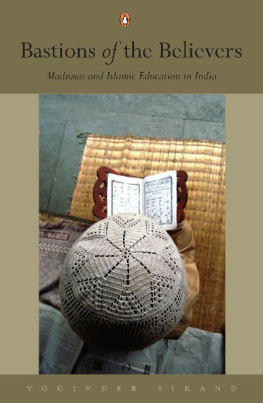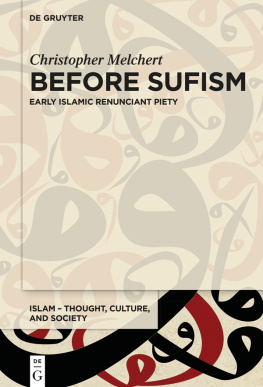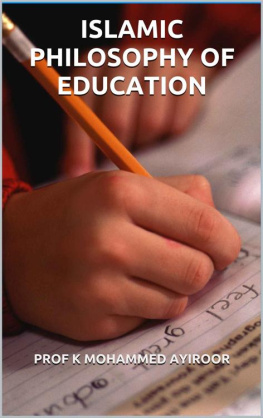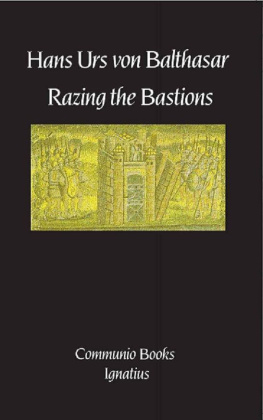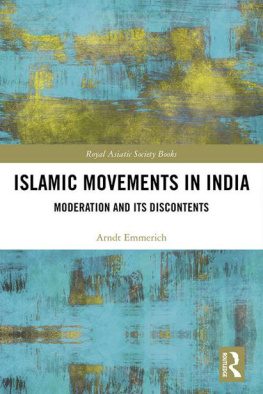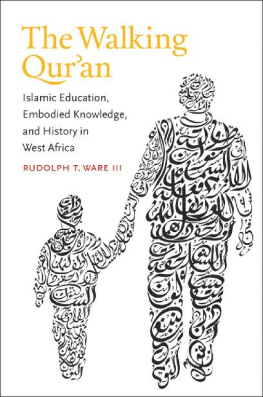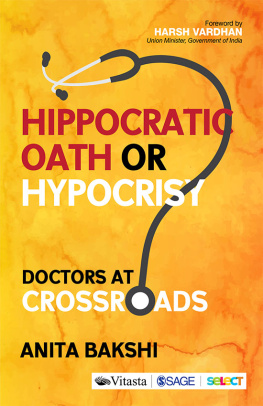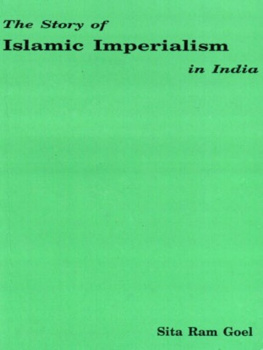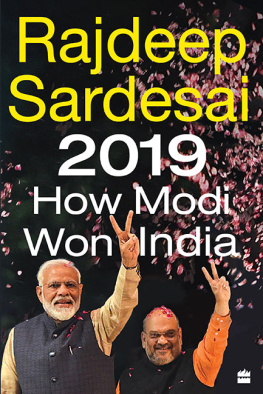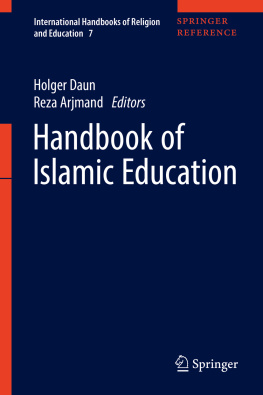Yoginder Sikand
BASTIONS OF THE BELIEVERS
Madrasas and Islamic Education in India
Contents
PENGUIN BOOKS
BASTIONS OF THE BELIEVERS
Yoginder Sikand did his M.Phil. in sociology from Jawaharlal Nehru University, New Delhi and his Ph.D. in history from the University of London. He completed his post-doctoral work on Islamic Perspectives on Inter-Faith Relations in Contemporary India at the International Institute for the Study of Islam in the Modern World, Leiden, the Netherlands. He has written several articles on Islam and Muslims in contemporary India and has previously published Sacred Spaces: Exploring Traditions of Shared Faith in India (Penguin, 2003) and Muslims in India since 1947: Islamic Perspectives on Inter-Faith Relations (Routledge Curzon, 2004).
He is currently a freelance researcher based in Bangalore.
Dedicated to the sacred memory of victims of terror in the name of religion and nationalism in South Asia
Foreword
I n recent years Yoginder Sikand has rapidly moved to the front rank of the coming generation of scholars of the Muslim world. Just ten years ago he came to me in London to begin research for his Ph.D. Since then he has published a prodigious body of research. This began with his Ph.D. thesis which was published as The Origins and Development of the Tablighi Jamaat 19202000: A Cross-Country Comparative Study (New Delhi, 2002). It has continued with Sacred Spaces: Exploring Traditions of Shared Faith in India (New Delhi, 2003), his book on Sufis in South Asia, their shrines, practices and constituencies, which was followed by a collection of essays published by the Royal Asiatic Society of Great Britain and Ireland, Muslims of India since 1947: Islamic Perspectives on Inter-Faith Relations (London, 2004). Since then two further collections of essays have been published in India, and now this major work on madrasas . In addition to these essentially academic contributions, Yoginder Sikand also writes frequently for the press, publishes a web magazine, Qalandar , which has a specific inter-faith agenda, and maintains his own email circulation list, which offers some fresh piece of research, or some comment, on aspects of contemporary Indian Islam almost every day. There is already a worldwide community of scholars which holds Yoginder Sikand in high esteem.
Yoginder Sikand is driven by a powerful desire to bring great harmony both to India and, by implication, to the world at large. The task before us, Muslims as well as others, he states in his introduction, reflecting on his purposes over the past few years, is to seek to explore and promote more liberal and open understandings of Islam, and indeed, of all other faiths. If we are to learn to live together despite our differences, inter-faith dialogue, struggling together for a more peaceful, and at the same time just, social order is, I have come to believe, one of the principal duties confronting committed believers today. In pursuing this end Yoginder Sikand has sought to use the outcomes of scholarly research to establish new levels of understanding about Muslim issues and thereby improve the quality of national and international discourse about them. This has of course meant that he has been increasingly concerned to do what many of the best scholars do, which is to liberate his learning from the narrow confines of scholarly publication, make it accessible to the general public, and make it work in the world. His one concern, following the spiritual traditions of the great faiths of South Asia, has been to be in the best possible position to enable his knowledge to create a better world for its peoples.
No one today, looking from an Indian or a global perspective, would question the importance of the task Yoginder Sikand has set himself. In a globalizing world in which, over the past thirty years, religious faiths have acquired a new significance, and their fundamentalist forms have seemed to become more widespread than ever before, there is no doubt that more bridges of understanding need to be built between the followers of the great religious traditions. For no faith is this more important than Islam, for whose followers the pains of adjustment to the demands of modernity have seemed to be particularly acute. That this should be so is hardly surprising. For a thousand years, from the eighth to the eighteenth century, the Muslim world, which came to stretch from the Atlantic coast of Africa in the West to Indonesia in the East, saw itself at the leading edge of human affairs; indeed, its trading networks and the knowledge which was shared across continents made it the world system which preceded that of the West. Then, from 1800, everything changed. By 1920 almost all the Muslim world was under European colonial rule. From the mid-twentieth century the end of that rule made little difference because it was replaced ultimately by the global hegemony of the West which, to most Muslims, has seemed to exert increasing pressure on their lives and on their values. In these circumstances, with their backs against a wall, insulted by the arrogance of the West, and often feeling humiliated by their treatment at Western hands, Muslims have had to review the legacy handed down to them from their millennium of triumph to see how they might go forward in the present. This has not been easy. It is hard, in such circumstances of weakness, to cast away the institutions, the forms of knowledge and the ways of thinking which have served a civilization well for much of its existence.
The search for knowledge of all kinds was at the heart of early Muslim civilization. As that civilization developed, two distinct forms of religious knowledge came to be recognized. The first was spiritual knowledge, the techniques of spiritual development which enable Muslims to know God, and the meaning of His revelation to man through the Prophet, in their hearts. This knowledge, and these techniques, were passed on by spiritual masters known as shaikh s or pir s. The second form of knowledge was knowledge of the Quran, the traditions and the shariah , and all the skills that Muslims might need to make them socially useful, from Arabic grammar and syntax to logic, philosophy, rhetoric and mathematics. This second form of knowledge, the formal learning of Islam, was made to work for each generation, and transmitted to new generations, by scholars, ulama . For most of Muslim history the spiritual and the formal traditions of learning have been seen as two sides of the same coin. Indeed, the best examples of both Sufis and ulama imbibed both spiritual and formal learning in good measure. While knowledge could be transmitted anywhere, typically Sufis might pass on their knowledge at the shrine complex of a saint in their order and ulama would pass on their knowledge in a madrasa.
Under British rule madrasas spread vigorously in South Asia. In doing so they reflected the many different responses of ulama to the challenges that rule presented, among them those of the Deobandis, the Barelwis, the Ahl-i Hadith and the Ahmadiyyas. Indeed, the Deobandi madrasas displayed a remarkable increase: in 1900 the Deobandis had established, or affiliated, just over thirty schools, but by 1967 they claimed nearly 9000 such schools worldwide. Arguably, the major reason for this development was a transformation of the function of the madrasas. No longer did they exist merely to train scholars and government servants. Now they were increasingly part of the frontline in defending Muslim society against both the pressures of colonial rule and Western culture, and the possibility of being absorbed into the wider Hindu world. Madrasas were no longer supported by the state, although the Muslim princes continued to play a role, but by public subscription. As part of their resistance to colonial rule, as well as being part of the process of Islamic revival and reform, madrasas, particularly in the Deobandi tradition, aimed to take Islamic knowledge to the people of India in languages they could understand, by translating key texts into Indian languages, and in cheap and widely available form, by the adoption of print. Thus, madrasas came to be rooted in the Muslim societies of India as bastions of Islam and Islamic culture. At the same time their ulama came, on the one hand, to see themselves increasingly as the champions of community interests and, on the other, to be an increasingly significant pressure group in the politics of British India, as demonstrated by their impact on public life in the Khilafat and Non-cooperation era and by their capacity steadily to assert the claims of the shariah over customary law, which had its crowning success in the Muslim Personal Law (Shariat) Application Act of 1937.



